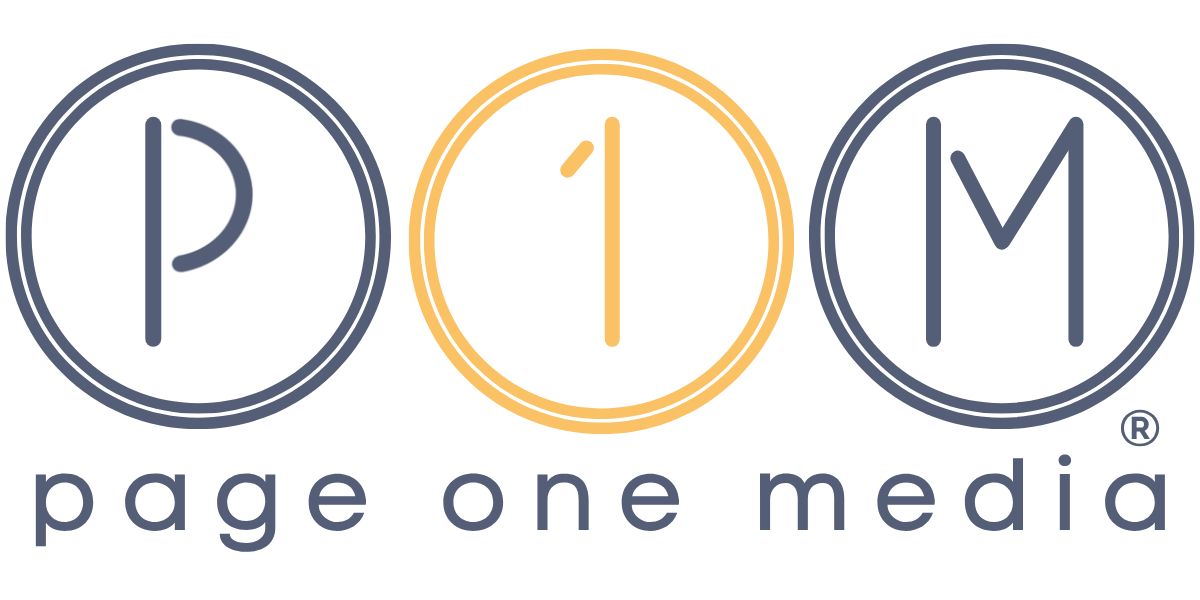
16 Aug How Do You Make a Living as an Author? (Part 2)
By Sarah Russo
When being an author or making all the money isn’t your goal…
Continuing on from last month’s post about how authors make money. I wanted to talk here about why making money might not be an author’s primary concern. There are lots of other good reasons to become an author. The large majority of authors that Page One Media works with are experts in something. Publishing a book is generally a means to an end for them. They are professionals, academics, and journalists—doctors, lawyers, judges, psychologists, they work in politics or are deans of colleges or run their own businesses. Their books expand their platform, help them secure tenure, and give them credibility. Not everyone needs to publish a book to do these things—save getting tenure which most professors need to publish to secure their position at a university (or publish scholarly articles depending on their institution). Even if this is you, the financial inner workings of publishing are still relevant to you and you should take a look back at last month’s post. If you need to or want to publish again in the future, you will need to sell books.
Why publish a book and what do you have to gain?
There are many reasons to publish a book. For the simple joy of it is one if you love to write. To convey your expertise and share it with the world, to increase your platform online and in the media, to share an important study or body of work, to shed light on a person, organization, or business that hasn’t been reported on yet (or hasn’t been reported on well). If there are lots of books already published on your topic, I would encourage you to consider whether publishing a book is right for you. Do you have enough of a public profile to beat out the noise of those other books and authors? How can you do it better? What is your new angle?
If you are a novelist, a poet, or short story writer, your path can be a more challenging one. To break out a novel or a book of short stories (we won’t talk about poetry because I don’t think it’s possible to sell large quantities of books of poems no matter who you are, well maybe if Patty Smith decided to write a book of poems, but I digress), can be quite a challenge. It requires a concerted team effort across publicity, marketing, and sales at your publisher and strong buy-in from the bookshops and media to succeed. Very long lead times are a critical component and if you want this to be you, I highly recommend talking to a publicist a year or more in advance. Even when all of that does happen and all at the precise right moments, sometimes people just don’t buy copies. It can be demoralizing but I encourage you not to give up. One of our wonderful clients, Amy Grace Loyd, author and longtime editor, wrote a great piece for Literary Hub about acceptance and rejection
There are still many things to gain even if this book doesn’t end up being that “big” book. You wouldn’t be the first novelist to come to us on book four and say, “if this one doesn’t break out, I’m not sure I’ll get the chance at another.” Even if a novel isn’t a huge success, it is often a springboard for a writer to teach creative writing (tenure, again), speak to students and teachers and touch their lives, bring challenging issues and experiences to the fore, simply entertain the readers you do reach, or give yourself a creative outlet. All very worthwhile things to do with a book.
What about scholars and their goals?
Let’s look at an example, if you’re an academic or a professional consultant, your book may only be expected to sell small numbers—sometimes even as little as 250 hardcover copies if it’s a monograph or highly specialized professional book. Your book is priced high, $125 or sometimes even more, and the expectation is that at that high price with a modest discount tied to it, the core audience for your book is going to purchase and your publisher will earn back their investment. You probably didn’t receive an advance for this book or if you did it was very modest—$1,000 maybe—it won’t take long to earn out on that advance but if your book doesn’t make your publisher money in the end, it can be hard to get that second book deal. Why so few copies? Well, this is largely a library book and it will go into online resources that are licensed to institutions.
High-priced professional and academic monographs have a major hurdle to deal with: Piracy. If you’ve ever downloaded a book off the web, then you have contributed to the problem here. Websites like Sci-Hub have pirated hundreds of thousands (I kid you not) of academic and scholarly books and academics and students are very actively downloading them instead of purchasing a copy or checking it out of the library.* Some librarians are even encouraging the practice because library editions of books are expensive and library budgets have been decimated in the last decade. There is very little that your publisher can do to prevent this. If you find your book downloadable online, you should let your editor know and someone in legal will send a cease-and-desist letter to have it removed but it will likely crop up again somewhere else. Make yourself an email template and just keep sending it.
Why am I telling you this? Because even if your book is scholarly or professional you still need to be an engaged marketer for your book. If your publisher hopes to sell 500 copies and they’ve only sold 200 that’s a problem and will likely hinder your ability to sell your next book. You are known in your field; you have contacts and opportunities (like conferences) to sell your book on behalf of your publisher.
I’m not saying you should sell books out of the trunk of your car, but if you’re speaking at a conference your book should be there. Ask the marketing team for a simple one-sheet with ordering information that you can give to the organizer of the event. Make it a condition of speaking that they order 20 (50, 100, 200) copies. Your publisher needs advance notice to organize and make sure your book is present so start early (six to eight weeks in advance) and follow up to confirm the order has been placed. It is important to keep in mind that scholarly authors have a part to play in getting their books out into the world and purchased if they want to continue publishing.
So, it’s tough out there, you get the idea. What’s an author to do?
You can start with engaging help and starting early. Building your platform or thought leadership or community doesn’t happen in six months. There are other resources here on this blog that you can read. That’s a good place to start. If hiring support is in your budget, and you are an expert, academic, or write literary fiction you could reach out to us.
But first and foremost, talk to your editor or publisher. They will have resources (how to set up your Amazon Author Central account, maybe best practices for social media platforms, and how to engage with them in a productive way). If your publisher isn’t ready to talk to you yet about promotion, that’s no reason to say to yourself, “it’s too early for book promo stuff” It’s never too early. Really. Three years in advance isn’t too early. Here is a short checklist of things you could be thinking about and working on.
Website: do you have one? If yes, is it current? Does it have an updated bio, links to your social media, a feed from Twitter or Instagram? Your upcoming speaking engagements? Any media you’ve done recently? Are you tagging for SEO?
- If you don’t have a website, we really like AuthorBytes. They have done these sites for P1M clients:
Social media: no, if you hate it, you don’t have to do it. But if you don’t hate it, I highly encourage you to choose one platform (two max) and really focus your efforts there. BookTok is really a thing, and I’ll let our very own Laci Durham address that in a future post. But for most professionals and experts with books, LinkedIn is what we recommend. Come find me there. If you’re a novelist, TikTok and Instagram are both great.
Literary networking: for all authors connecting with your local and wider literary community through bookshops, readings, events, reviewing other people’s books, and being a regular at your library can all be helpful. Everyone will be happy to help you when your book arrives if you’re already a part of their community. If it seems like you’re only getting to know them now because we need them to buy or help you with your book in some way, that isn’t going to go over as well. You’re a writer, being a good literary citizen is a big part of this culture.
Speaking: is a vital part of selling books. You don’t need a book to speak and if you’re not already speaking, starting to build those connections in advance of your book coming out will be helpful.
Media: being an expert means being cited in the media when news in your space comes up, getting the call from NPR, a podcast, or a cable news show when there is an opportunity for you to inform and educate. If you’re not doing that already and would like to, we can help.
No one wants their book to fall flat, whether your primary purpose is to make money or disseminate information. Hopefully, the advice above is a guide to how you can better support the work your publisher will do for current and future books. And if we can help in advancing your goals, I hope you will reach out.
Sarah Russo is the founder of Page One Media. You can connect with her on Twitter @sarahrusso, Instagram, and LinkedIn. You can follow the work of Page One Media on LinkedIn, @pageonem on Twitter and @pageonem on Instagram.
*Piracy as a solution to open access is a fraught and complex issue. I believe in open access and its potential to fuel research but until the whole system changes, it’s not realistic to ask publishers to fully shoulder the burden of publishing articles and books and not be able to recoup any of their costs of production.

